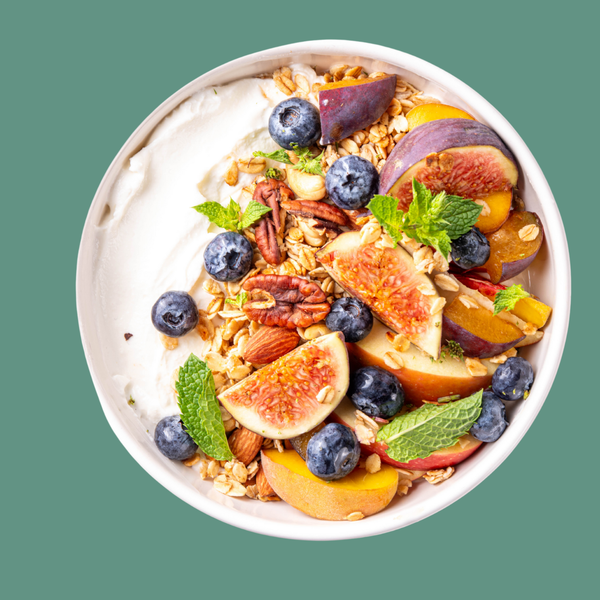PCOS and Food Cravings: How to Manage Them and Improve Fertility
Food cravings are common with PCOS and can feel hard to manage. Hormone imbalances, insulin resistance, and stress all play a role. The good news? With balanced meals, smart snacks, and supportive strategies, you can manage cravings, support hormone balance, and improve fertility.

If you live with PCOS, you may know the feeling: cravings that feel almost impossible to ignore. Research shows that the hormone imbalance in PCOS may change the way our bodies regulate hunger, making cravings stronger and harder to manage.
The good news? Understanding why cravings happen — and learning how to work with your body instead of against it — can help you manage PCOS and improve your fertility.
(As you read, you’ll notice references to upcoming articles. When they’re published, we’ll link them here — if you’re signed up for Food & Fertility Insights, they’ll land directly in your inbox.)
Why PCOS Increases Cravings
Insulin resistance: Up to 60-75% of people with PCOS have insulin resistance. Insulin Resistance is when the cells don’t respond to insulin very well. This causes blood sugar to be higher, and the body produces more insulin to try to compensate. Higher levels of insulin in the blood can cause hunger and food cravings. For a deeper dive into how blood sugar impacts hormones and fertility, see our article: How Blood Sugar Affects PCOS & Fertility.
Androgen imbalance: Higher levels of “male” hormones may stimulate appetite regulation, affecting ovulation and also making cravings more frequent.
Brain–gut signals: the hormone imbalance seen in PCOS also affects the hormones that are responsible for hunger and being full (satiety). When these signals don’t work properly, it’s harder to identify hunger and feel satisfied after eating.
Emotional impact: Living with symptoms like acne, weight changes, or fertility challenges can understandably affect mood and self-esteem. Stress and low mood can also lead to craving and comfort eating.
For an overview of how PCOS impacts fertility, see our article: PCOS and Fertility.
The Vicious Cycle of Cravings and PCOS
Cravings aren’t just uncomfortable — they can create a loop. PCOS-related hormone changes drive cravings, and responding to those cravings with quick-fix foods (like sweets or fast food) can worsen insulin resistance, increase weight and lead to even more cravings.
The encouraging part is that by using food, lifestyle, and support strategies, you can calm cravings, improve hormone balance, and support your fertility.

Practical Strategies to Manage Cravings & Support Fertility
Build Balanced Meals
Combining complex carbohydrates, protein, fiber, and healthy fats helps steady blood sugar, reduce cravings, and balance hormones. Over time, this helps support regular ovulation and improves fertility.
Try: overnight oats with chia and berries for breakfast, a turkey and hummus wrap for lunch, and grilled chicken with sweet potatoes for dinner. See upcoming articles: What Does a PCOS-Friendly Breakfast Look Like?, Quick PCOS-Friendly Lunch Ideas, and Easy Dinner Ideas for Hormone Balance and Fertility.
Don’t Skip Meals
Going long stretches without eating can lead to cravings. Regular meals help keep energy stable, support hormone balance, and help regulate ovulation — all key for fertility with PCOS.
Snack Smart
Balanced snacks can also help reduce cravings, and give your body steady fuel to support reproductive hormones and fertility.
Try: hummus with veggies, cheese with whole grain crackers, or a handful of nuts with fruit. See upcoming article: Snack Swaps for Fertility.
Hydrate Wisely
Choosing water or unsweetened sparkling water instead supports stable insulin levels — an important step for fertility with PCOS. Sugary drinks can spike blood sugar and can lead to food cravings and further imbalance hormones. See upcoming article: Beverage Guide for Fertility.
Support Mood and Stress
Stress and low mood are powerful drivers of cravings, and they can also disrupt ovulation and fertility hormones. Movement, mindfulness, or talking with a supportive professional can calm cravings while creating a more balanced environment for fertility.Going long stretches without eating can cause blood sugar dips and make cravings worse. Regular meals keep energy stable and may help reduce cravings.
Try: overnight oats with chia and berries for breakfast, a turkey and hummus wrap for lunch, and grilled chicken with sweet potatoes for dinner. See upcoming articles: What Does a PCOS-Friendly Breakfast Look Like?, Quick PCOS-Friendly Lunch Ideas, and Easy Dinner Ideas for Hormone Balance and Fertility.
Snack Smart
Balanced snacks can prevent dips in blood sugar and reduce the intensity of cravings.
Try: hummus with veggies, cheese with whole grain crackers, or a handful of nuts with fruit. See upcoming article: Snack Swaps for Fertility.
Hydrate Wisely
Sugary drinks can cause sharp spikes (and crashes) in blood sugar. Choose water and unsweetened sparkling water. See upcoming article: Beverage Guide for Fertility.
Support Mood and Stress
Stress and low mood are powerful drivers of cravings. Movement, mindfulness, or talking with a supportive professional can help.
Breaking the Cycle and Supporting Your Fertility
Cravings with PCOS are real. They’re a result of complex hormone and brain–gut interactions. Luckily, with balanced meals, smart snacks, and supportive strategies, you can break the cycle to manage your health and improve your fertility.





